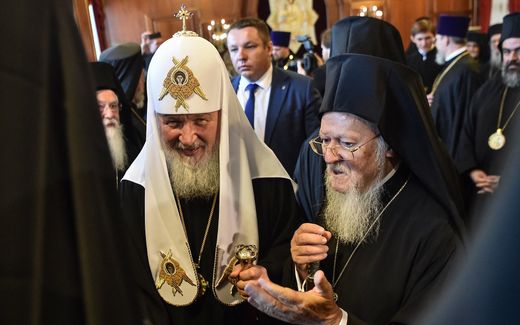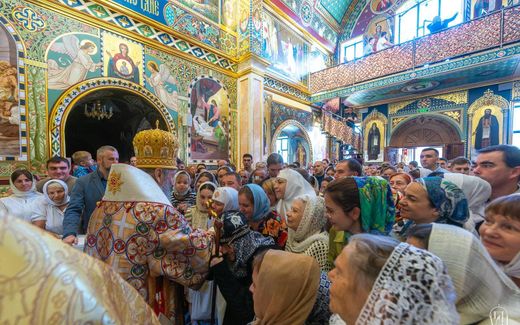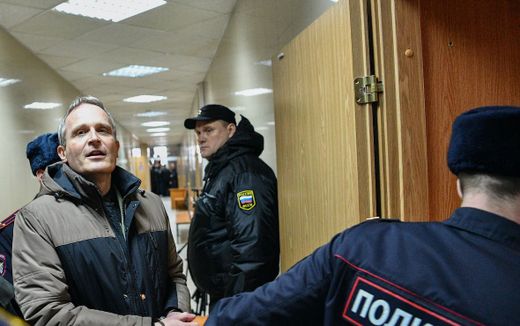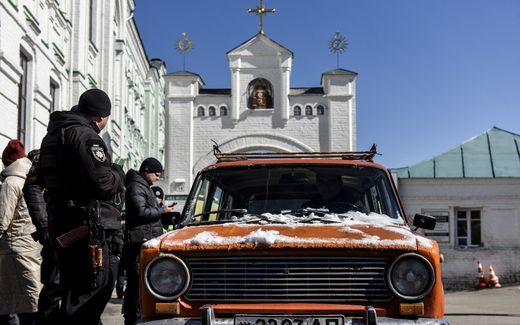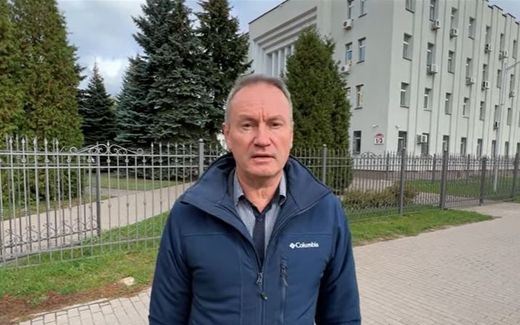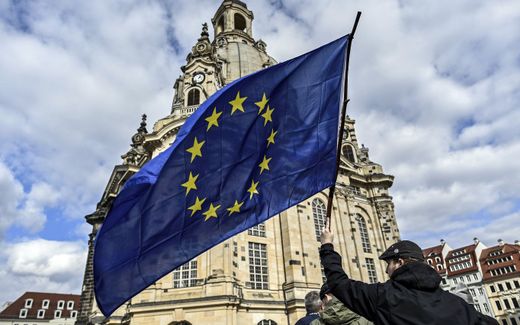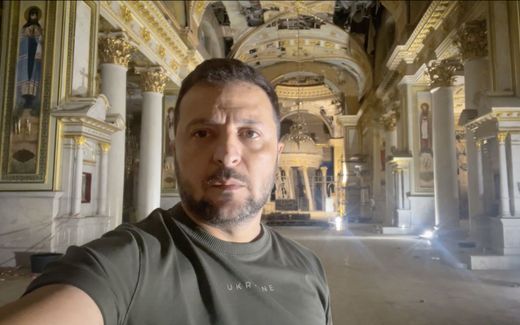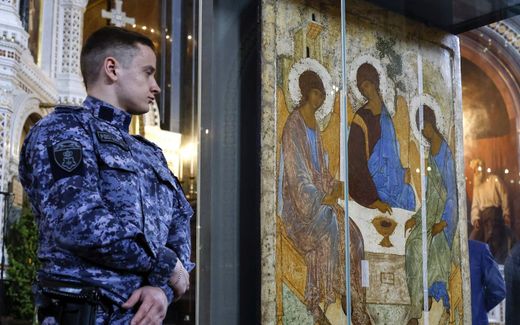How can Ukraine curb the Russian-affiliated church and still connect with the West?
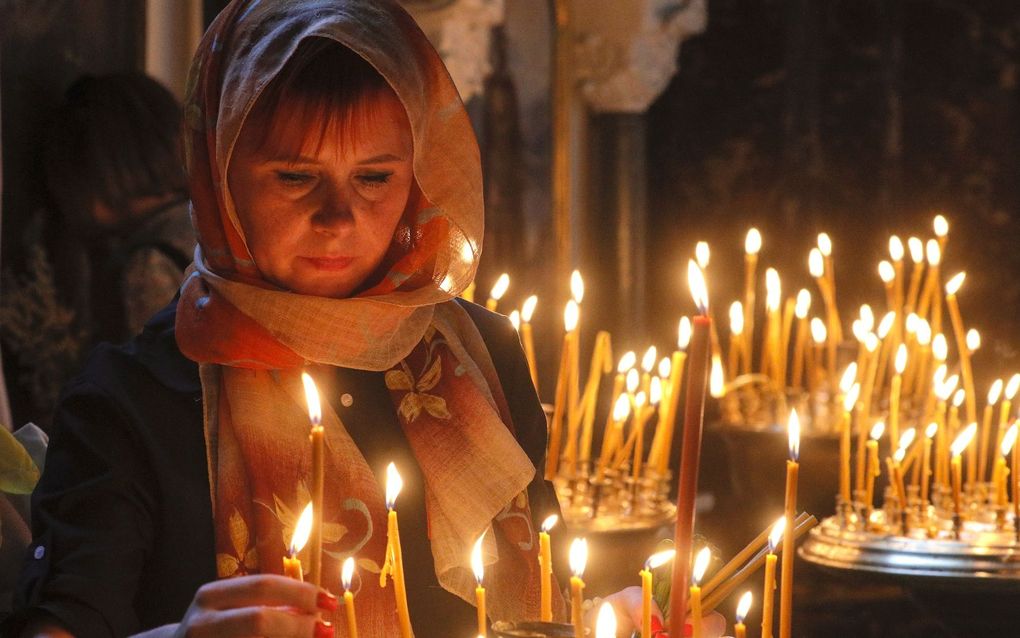
Most Ukrainians share the Orthodox faith with the Russians. Photo EPA, Sergey Dolzhenko
Eastern Europe
Believing is not easy in Ukraine. The largest church in the country stands under suspicion of being pro-Russian. What can Kyiv do with the Ukrainian Orthodox Church (UOC)?
The UOC is the oldest church in the country. Through the ages, it was connected to the Moscow Patriarchate (MP). But now, the MP is led by Patriarch Kirill, a staunch ally of President Putin. Kirill’s theology also justifies the war against Ukraine.
For this reason, the UOC has tried to distance itself from Moscow as much as possible. It has declared itself fully independent in May 2022. But at the office of the Moscow Patriarchate, they have not changed the books. So, officially, the UOC is still affiliated with Kirill.
Does Ukraine try to curb the church?
Some have tried to do this directly by banning the UOC in an act of Parliament. Since 2019, there is an alternative to the denomination: the Orthodox Church of Ukraine (OCU). That is connected to another Patriarchate in Constantinople. This new church was formed under the political leadership of President Poroshenko.
The idea of the politicians was to forbid the UOC and to point out that the people could join the OCU. But this summer, it became clear that not enough Members of Parliament would support such a bill in the Verkhovna Rada.
Early October, it became clear that there were now enough (226) votes to curb the church indirectly. It might be possible that the parliament will vote about the resolution within a few weeks.
On what ground will the state try to curb the church?
The bill says the court can liquidate a church if it spreads war propaganda or hatred. The bill was drafted by Vasily Malyuk, the head of the SBU, the Ukrainian security service. He wrote a letter of support to the Verkhovna Rada.
There is a deep suspicion against the UOC, although it is still the largest religious community in the country. The suspicion is that the connection with Moscow leads to a natural flow of anti-Ukrainian information and pro-Russian propaganda.
Last winter, the police searched some monasteries from the UOC. They found some priests and monks who had pro-Russian material. The result is that 65 clergymen of the UOC are prosecuted. Of these 65 accused, 15 are said to be bishops. The crimes committed are public agitation, religious hatred, even the selling of firearms, and possession of child pornography.
Is a legal limitation the logical answer to this? Of course not. It would be more practical to give those 65 clergymen a fair trial without curbing the rights of the whole church.

The UOC is not a “criminal enterprise”. To liquidate the church would only be possible if spreading war propaganda would be the nature of this community. But that is not true. The UOC has been on the side of Ukraine since the start of the conflict in February 2022. It is still active in supporting the Ukrainian army.
It seems to be a political move to de-legitimise anything with Russian flavour. Within the UOC, some parishes use Russian as the primary language, which is sensitive for the Ukrainian authorities. And since the UOC, in theory, still recognises Patriarch Kirill as head, this also causes some pain.
Is it possible to ban a church?
Naturally, yes. All autocratic regimes have done those things. Russia has even forbidden the Jehovah’s Witnesses. All evangelists from this community could end up in jail.
It is not the Western style to do such a thing. In Western countries, believing or not believing is entirely free. In most countries, registering yourself is unnecessary as long as the church has no property or other legal commitments.
Ukraine still has a sort of Soviet-style registration, the German expert Thomas Bremer (University of Muenster) explains this week to Dialog.TUT. As in Russia, in Ukraine churches have to register to have freedom of religion. The difference is that Russia has only recognised five official religions; the rest are neither legal nor illegal. But in Ukraine, churches can lose the registration and continue in a legal limbo.
Prof. Bremer recommends Ukraine to act as a “modern and democratic” society and give space to religious diversity. “The Russian example shows how far a state can go when it rejects diversity.”
According to Bremer, it is not right to ban a church simply because some members break the law. “To ban it, it is necessary to prove its systematic anti-Ukrainian activity. In fact, however, I see no such activity.”
Does Ukraine have freedom of religion? In name, yes. In practice, that is debatable. In the first week of October, the UN High Commissioner of Human Rights published a report, that showed some severe breaches of the international treaties.
Although just a few pages of the report speak about religion, it is evident: that, in wartime, people have the right to their conviction. The Ukrainian government has taken measures against the UOC, including terminating the lease of the ancient monastery Pechersk Lavra in Kyiv. Church people are still there, but officially that is illegal. Many places of worship have been searched without good reason, which created a sphere of suspicion. Another example is the use of physical violence against parishioners of the UOC under the eyes of the police without any preventive action.

The recommendation to both parliament and government is to guarantee that legislation does “not unduly restrict freedom of religion or discriminate against any religious community”.
This is a report from the UN itself. Other analysis supports this. The UN human rights advocate Oleg Denisov expressed himself comparatively before the United Nations in Geneva this week.
Will such a report have an impact on Ukraine? Not today, and perhaps not tomorrow. But sooner or later, Kyiv cannot deny it any longer. This UN report does reflect a general opinion from the Western world that state and church should be separated and that the state cannot prefer a church because its ethos comes nearer to the political goals. If Ukraine wants to join the European Union, NATO and other Western organisations, the country can impossibly ignore this.
Above that, this report is not the first that expresses concerns about religious freedom in the country. And last week, at another level, former President of the European Commission Jean-Claude Juncker said that “Ukraine is a country that is corrupt at all levels of society”. This would have consequences for the EU membership plan.
This underlines that Ukraine still has much to repair to meet Western demands.
Related Articles


